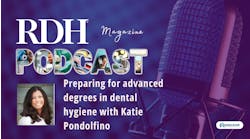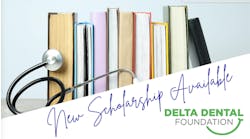Dear Readers,
In my seminars, my attendees ask some very good questions. This column will look at several of the most often asked questions.
1 My boss bought an existing practice from a doctor who never employed a hygienist. Do you have any suggestions on how to approach these patients with the news that they have periodontal disease that was not previously diagnosed or discussed?
This sticky situation calls for tact, discretion, and excellent communication skills. The patient must be informed that there is a problem without making the former doctor appear negligent.
There are two things to remember here:
• Never, never disparage the previous doctor or his or her work.
• Yesterday is in the past, and all you know about is today. The first thing you must do is "raise the red flag" in the patient's mind that you've discovered a problem.
Actually, the true problem is subgingival calculus and the residing pathogens that have been undisturbed for a long period of time. You and I both know that those chunks do not form in six months, and whoever was seeing the patient previously missed finding and removing it. In most cases, there will be bleeding in those areas.
You might say, "Mrs. Jones, have you noticed this area bleeding when you brush your teeth?" Her answer is immaterial. You just want to know if she has noticed.
Then you might say, "Hmm ... I see this area is very inflamed and bleeds easily too. I think we need to have the doctor look at this before I proceed."
The patient is thinking, "Uh oh, something's wrong." You have "raised the red flag." You should do enough probing to arrive at an initial periodontal classification so you can inform your doctor outside the patient's hearing. Then the doctor can come in and make the formal diagnosis.
Patients are not stupid. If the patient makes a comment like, "Well, the other doctor never found any problems. I don't understand..." that's when you can say, "Since I have not seen you previously, all I can go on is what I see today. Thank goodness you are here, because obviously there have been some changes."
Let the patient figure it out or come to her own conclusions. Further, showing a patient calculus on a radiograph is very compelling evidence.
2 Is it beneficial or not to have the patient rinse with chlorhexidine prior to or during the treatment, and does subgingival irrigation help?
In the September 2003 issue of RDH, my friend Shirley Gutkowski wrote an article on the value of preprocedural rinsing. She quoted one study that showed a 94 percent reduction in airborne pathogens by having a patient rinse for just 30 seconds with Listerine(r). That study was conducted by D.H. Fine, et al., and was published in the Journal of the American Dental Association in 1993. Since airborne pathogens have been shown to linger for up to 30 minutes following use of a power scaler, the benefit is for you, the clinician, and for the next patient who will sit in your chair. Essential oils have been around since the 1800s and have been proven safe. Further, a patient can rinse with water after the 30-second Listerine rinse and not decrease the effectiveness.
Your question asked about chlorhexidine specifically. My feeling is that chlorhexidine has more substantivity than essential oils and is a better choice when treating patients with periodontal disease. The recommendation is to rinse for 60 seconds, and the effectiveness is supposed to last for eight hours.
There are other products that can be used for preprocedural rinsing with your general patient population, such as Oxyfresh(r), BreathRx(r), and others.
It should also be noted that overuse of any mouthrinse can lead to imbalance of the normal oral flora and possible precancerous lesions.
The second part of your question is related to subgingival irrigation. The American Academy of Periodontology published a position paper in 1995, and you can access it at: http://perio.org/resources-products/pdf/7-Irrigation.pdf. This 16-page document looks at many different facets of irrigation, both supra- and subgingival. The conclusion is that irrigation helps with gingivitis, but a "now and then" subgingival irrigation routine has not been shown to have long-term results. However, I am aware of other studies that have shown subgingival irrigation on a daily basis over a period of time can produce very positive results in controlling subgingival pathogens. You can read more about this subject if you go to http://www.perio.org and type in "Subgingival irrigation" in the search box.
3 Is it possible that some people have bleeding gums, even when their oral hygiene is very good?
The answer is a resounding "Yes!" Some people have capillary fragility that is not related to their oral hygiene at all. There are numerous systemic influences that can cause tissue to bleed easily, including, but not limited to: diabetes, systemic lupus erythematosus, oral contraceptives, smoking cessation, pregnancy, lichen planus, medications, heredity, and vitamin/mineral deficiencies. Although we have learned much over the past 10 years about the oral/systemic link, I believe we have just seen the tip of the iceberg on this subject.
4 Is it better for a hygienist to be paid a straight salary or on a commission basis?
The daily (or hourly) rate is probably the most common method of compensation for dental hygienists. There's no risk involved, as your pay is guaranteed whether your patient shows or not. In offices where keeping the hygiene schedule full is not a priority, a flat daily/hourly rate is more desirable. Herein lies the secret to happiness working on commission.
When the hygienist works on commission, broken appointments and unfilled time takes on new meaning, because the hygienist's pay is directly affected. There is more pressure on the hygienist and business assistant to keep the schedule full. If there is a dedicated scheduling coordinator who places top priority to keeping a full schedule, the chances are good that a commission-based pay arrangement will work fine.
In talking with hygienists all across the country, those who work on commission are generally happy. They find their compensation is higher than their peers who work for a flat rate. As long as open time is held to a minimum and the commission percentage is fair, there is great potential for exceptional pay. Additionally, the doctor is happy, because he or she is not paying for down time. The hygienist on commission will get a pay raise anytime there is a fee increase, and the doctor doesn't have to worry about negotiating wages.
One popular method of compensation for hygienists is a base rate of pay plus a commission, based on the total production of the hygienist. With this method, the hygienist that works hard and has a good production day gets to share in the increase.
For example, let's say your base rate is $25 per hour. That would be $200 per day for an 8-hour day. The production goal is set at $700. On day one, the actual production is $950, the difference being $250. Multiply $250 X 30 percent, which is $75. So, for day one, the hygienist would make $275. The percentage can be higher or lower, based on other fringe benefits. With this method, at least there is a guaranteed base.
Compensation issues are often multifaceted, and there are many roads to reach the same destination. The bottom line is that any bonus incentive should be simple, fair, and achievable. As for straight commission, issues relating to scheduling and actual procedures included in the commission have to be addressed.
The most important thing to remember is that on commission, there will be both high and low production days. You take the good with the bad. Hopefully, there will be more good days than bad, which is usually the case. For you to decide which method of compensation would be best for you, I would suggest going back six months to get an accurate picture of production and down time. If you are a motivated, hard-working hygienist, the chances are great that you will like a commission-based pay arrangement.
Sincerely,
Dianne
Dianne D. Glasscoe, RDH, BS, is a professional speaker, writer, and consultant to dental practices across the United States. She is CEO of Professional Dental Management, based in Frederaick, Md. To contact Glasscoe for speaking or consulting, call (301) 874-5240 or email [email protected]. Visit her Web site at www.professionaldentalmgmt.com.





